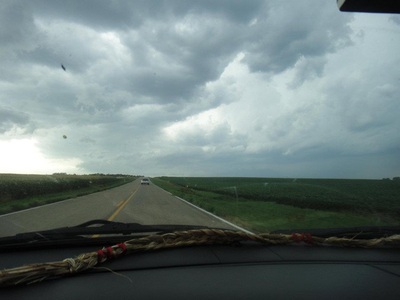Critical polyamorist blog
|
During the past fourteen months of my iterative commitment to polyamory, one question occasionally troubles my mind for difficult hours. In the midst of my gratitude for what I have in a world of hardship and sorrow, I grow sad for a time and struggle with this predicament: Am I pursuing polyamory because I have given up hope of ever finding a person so compelling and compatible (and available and in the same country!) that we could remain committed to one another for the rest of our lives? This is the main question I return to time and again, and my chief struggle in polyamory. Am I taking the easy way out? Trying to avoid vulnerability? Disappointment? Commitment and compromise—the hard work of fidelity to another rather than just myself?
In the moments of struggle I also sometimes wonder if I am just too like my parents, neither of whom were able to sustain lifelong romantic partnerships. My life is richer with nurturing and opportunity than theirs were, but I share their propensity for travel and migration. They were both workaholics, both running from but also always returning home. I have come to see their migratory practices as not wholly dysfunctional but as a productive act of survival. And they just crave the road. So do I. Too bad poly wasn’t a viable choice for my parents in their non-privileged mid- to late-20th century middle America world. Maybe both of them would have had more success in love, felt less like failures or oddballs in that regard. Their serial monogamy and that of my extended family members over the course of decades did none of us much good. I saw more than my share of failed marriages and dysfunctional couple relationships. It is sad to remember so much unrealistic idealism and expectations that could never be fulfilled coupled with controlling, dishonest, and disrespectful behavior of men towards women, sometimes of women towards men, but most of all the collateral damage to the children involved. Our struggles were clearly shaped by oppressive colonial institutions that deeply damaged Native American families and communities for more than a century. I see now that there was little possibility of living up to the successful nuclear family ideal. On the other hand, despite colonization, we are still accomplished at cultivating networks of extended family—biological, adopted, and ceremonial—and that makes me proud. And it is probably a key reason that I find myself drawn to this non-Native American practice called polyamory. In its ideal form as I imagine it, poly can help build extended family that includes but goes beyond the restrictive bonds of biology. Whatever the history that brought me to here—whether it is family- or culture-specific, a result of colonial history, or a fundamental human condition (some like to argue that non-monogamy is biological nature), whether it is nature or nurture or both—every time I enter the space of struggle over poly versus monogamy, I walk out the other side still committed to polyamory. I am certain that even were I to find “true love” again (I think I’ve felt that at least twice in my life), I’d find myself back here in a few years, facing a choice to open that relationship. For I no longer believe that it is realistic or fair or ultimately loving to myself and to my partner to command that each of us legitimately long for and be only with one another. I am also coming to believe as I weigh healthy and honest monogamy against healthy and honest polyamory, neither is any more or less difficult. They both involve considerable emotional work, ethical commitment, the courage to be vulnerable, good communication skills, compassion and withholding judgment. In other words, neither set of practices, if they are to satisfy on multiple levels, allows us to slack. I must therefore decide how to live, love, and desire in the way that seems to best fit me, and I am fortunate to have the resources to do that. While my ethical and analytical head always chooses polyamory, my heart is still deeply conditioned by the romantic and illusory ideal of safety in monogamy. And my body wants what both can offer: connection. In this struggle, I often let my head lead the way, which helps remake my heart. My heart, in turn, prompts new analyses. This blog is part of that. Only fourteen months after embarking on the path of poly, I find it hard to remember its origin. How did I find the path’s beginning? How long did I ponder it before I started walking? I surely must credit the influence of queer thinkers, some of whom are my friends—both their analyses and the fact that more frequently than straight people they practice ethical non-monogamy. Although queers less often label it polyamory. That label seems to be more the domain of straight people. I know that I did not buy the poly self-help books until after I’d made the decision to try and de-program myself from monogamy. And I know that it is not something I considered when I made the decision, three years ago, to leave my marriage to a stellar human being. But it was marriage itself that had always felt like an ill fit to me. And I worried about the effect that growing unhappiness would have on our child. But still I was committed to serial monogamy back then. I believed I just had to find the right “one” and everything romance-wise would fall into place. But that did not happen. I tried for a couple of years once I felt my heart open up again after I kept it closed in marriage. But for various reasons opportunities with people I could imagine spending a life with appeared, and then faded. In my age, education, and class range, I meet too many potentially suitable matches who are still tangled up emotionally, psychologically, and financially in monogamous relationships, many of them troubled or unsatisfying. And those who are single are often scarred by their previous committed relationships gone terribly wrong, yet many are still committed to a monogamous ideal. Others see themselves as sexual and emotional mavericks who reject commitment and embrace non-monogamy, but without the openness and extreme level of communication that is a hallmark of the poly ideal. These types are an especially bad fit for me. Like them, I may have early on viewed non-monogamy as a way to have smaller, more manageable connections in the face of “true love’s” absence and in the face of competing commitments, such as work. Work comes first. It not only helps support my material well-being and that of my child, but it is through work that I enact my ethical and political commitments to this world. My work is my spiritual practice. My commitment to egalitarianism further complicates my ability to live up to that idealized form of romantic commitment in our society, monogamous marriage. I am not following anyone around, and I don’t want anyone sacrificing their path to follow me. But unlike the anti-commitment mavericks, I don’t want to reject love and meaningful attachment to other humans in the form of romantic relationships. To be sure, I’m nervous of the pain they can bring: but I know I want it. I am like this in friendship too. I crave platonic ties that enfold love and intimacy that will last to our dying days. Ultimately, being non-monogamous does not free me from the work and emotional risk of love and commitment. Rather, it re-shapes what love and commitment (can) look like, requiring me to negotiate them with multiple partners instead of one. Poly can also sometimes blur the boundaries between platonic and romantic love. A caveat: I’m not knocking sex for the sake of sex. For some people that is what fulfills them. It is not sufficient for the intimacy I crave. Routes after Roots I had an epiphany a decade ago that rootedness in one place—finding that one true geographic home—will never be something I can find on this planet. What a relief to realize there is no one true place for me, and that there is nothing abnormal about that feeling. I could stop feeling like a failure, fickle, a commitment phobe, like travel is just running, like I was doing it all wrong. Along with that realization, came the knowledge that standing still too long has its own ethical risks—complacency, eclipsed vision, and judgment. I must be regularly challenged on the borders of different worlds, always living in translation. Yet after the decade-long sense of disconnection I could never overcome living on a mountainous coast—on land that moves but under skies that are still—I realized that I need to spend more time on flat, expansive land. If not in the spot where I came into this world in human form, it had to be something like it. This land where I live now is warmer than my birthplace, but still the skies are tumultuous, breathtaking and life giving. And I need rivers like I need the roads and the skies. Rivers are the lifeblood of my historic, metaphoric, and literal topography. I grew up near rivers. They symbolize for me leaving and returning in a regular migratory pattern. They are movement and place simultaneously. Like me, like my parents before me, and historically my migratory ancestors, rivers are routed. I live on the banks of one now. Luckily, my work also enables me to travel and to stay periodically in place. I am rewarded for my skills at translation between literal and technical cultures, between conceptual languages. Travel enables me to co-parent my child who lives with my ex-husband during the school year. As soon as I found it, I embraced the knowledge that I am at peace only living en route, leaving for different and challenging far-off lands, then returning to expansive plains and skies, a more tolerant, thoughtful, and grateful person. Routedness, not rootedness, allows me to lead an ethical life.[1] But what of relationships? How could I hope to find someone who can live such a life with me while having their own life? I am fortunate to have encountered a few (potential) romantic partners of whom I was enamored and could take anywhere: curious, tolerant, adventurous, grounded intellectuals who like me come from humble economic backgrounds. Individuals who share my lenses and could grow with me in travel. Yet for a variety of reasons, most of them were ultimately unavailable. But even if one had been available, would I have nonetheless eventually faced the choice of polyamory? Yes, probably. For not only am I routed through different lands, but I am routed in my work. I am fidelitous to multiple institutions and technical tracks. I attribute this second form of routedness also in part to my mother and to the life she created for us as children. She also craves diversity in social relations and from her I learned to build and cherish a stunningly diverse community. It spans many classes, races, nations, technical specialties, levels of ability, sexual and political orientation. I need diverse people with their multiple worldviews and their different knowledges in order to make sense of the world. My family, friends, colleagues, and lovers will often not be comfortable in one another’s presence. But this is the challenge and the existence I crave and which satisfies me: to be continuously routed geographically, conceptually, and intimately. Again, polyamory is for me an intellectual, political, and emotional project all wrapped up in one—each aspect re-shaping the others. But since I am more accomplished at the intellectual than the emotional, I sometimes lean harder on my analytical abilities and my political commitment to non-monogamy to strengthen my resolve to keep navigating the challenging social, moral, and cultural landscape that is poly. If I want a home there, I must help build it. Just like there is no perfect one true love out there waiting for me, just like I have to create and nourish democratic relationships and knowledges, so must I nourish and help constitute the diverse and democratic poly world I want to live in. In the end, polyamory is not only intimacy constituted by love and sex, but fundamentally by openness to multiple connections. It involves emotional, intellectual, and physical plurality rather than “promiscuity,” which is usually negatively defined as entailing a casual, transient, and indiscriminate approach to intimate connection. But the plurality of polyamory can equally be understood not as excess or randomness but as openness to multiple complex connections, some of them not as complete as one might require in monogamy when you can choose only one person. But when they are combined, cultivated, and nurtured, multiple connections constitute sufficiency, and sometimes abundance. The ideal of polyamory requires an honest recognition that life and love are ever in flux. Too often the ideal of monogamy tells us to deny this. It lulls us into thinking we can get things settled, that we are ever safe and secure in our one true relationship. Polyamory does not let us rest in this idea. In its best form, poly leads us to abundance, negotiated and built through work and care. It takes us beyond that sad and debilitating world in which fear of scarcity and deprivation dog us into a severely circumscribed set of choices that we then think we need to live with for a lifetime. Monogamy can be better than that of course, but often it is not. With polyamory as a legitimate choice, I wonder if our standards for and skills with monogamy would improve as well? As Ever, The Critical Polyamorist Note: [1] I owe this language that helped me to understand what I have long felt to James Clifford as he articulated these concepts in his book Routes: Travel and Translation in the Late Twentieth Century. Cambridge: Harvard University Press, 1997.
12 Comments
Situationally Poly
1/8/2014 05:42:29 am
I think of the polyamory experience as a journey, hence the handle "situationally poly." At least for me that's how it is. It's definitely a journey down the road less traveled, an unpaved road full of scenic beauty (and wildlife!) as well as unknown dangers. It was characterized by the need for me to be true to myself, to live authentically and honestly which is not very easy to do in a society that has little tolerance for alternative sexual lifestyles.
Reply
Critical Poly
1/8/2014 06:55:46 am
dear situationally poly,
Reply
Situationally Poly
1/9/2014 12:42:45 am
When I originally made that post it was very long but it mysteriously got lost......urrrrgh! There were other thoughts in there I want to try to reconstruct.
Situationally Poly
1/9/2014 12:43:06 am
When I originally made that post it was very long but it mysteriously got lost......urrrrgh! There were other thoughts in there I want to try to reconstruct.
Almost Poly
1/8/2014 11:26:02 am
Awesome. I especially loved the contrast between those who engage in multiple partners and relationships but can't pony up and embrace the openness and communication of polyamory. I do not approve of dishonesty.
Reply
Critical Poly
1/9/2014 12:09:00 am
dear almost poly,
Reply
CriticalPoly
1/19/2014 04:15:07 pm
Dear Situationally Poly,
Reply
CriticalPoly
1/19/2014 04:22:24 pm
Dear Situationally Poly,
Reply
1/20/2014 08:36:03 am
"Am I pursuing polyamory because I have given up hope of ever finding a person so compelling and compatible (and available and in the same country!) that we could remain committed to one another for the rest of our lives?"
Reply
CriticalPoly
1/20/2014 10:34:51 am
Dear Tammi,
Reply
2/1/2018 07:37:34 pm
I, too, came to an epiphany many years ago that I could not live rooted in one geographical place. In spite of that, I lived on and worked a farm in eastern Washington for 23 years. I was also monogamous during that course of time. Fast forward to a couple of years ago when I was anchored out in the Bahamas one summer evening. I was invited to dinner by a couple anchored nearby. As we spoke of our love for boats and the sea, my friend said his brother was different. He had a piece of land in the mountains with a cabin. And that was okay for his brother, but my friend could never live like that. I told him I understood his brother's affinity for his place in the mountains because I loved the mountains too. He was livid. He said, "That's impossible! You can't love both. It has to be one or the other." I was a little taken back. I had never thought of it that way. Why if I love one must I deny myself the other.
Reply
Critical Poly
2/1/2018 09:22:27 pm
dear keith, thanks for your comment. i really appreciate your also linking land/water and human loves. i'd like to hear your explanation of the different/overlapping? things mountains and see nurture in you. for me it's prairies and rivers and low rolling hills. i better get back to writing if you're going to be a loyal follower. i've been focusing on academic writing lately but i miss how intensely these blog posts come for me so i do want to get back to them.
Reply
Your comment will be posted after it is approved.
Leave a Reply. |
Photo credit: Short Skirts and Cowgirl Boots by David Hensley
The Critical Polyamorist, AKA Kim TallBear, blogs & tweets about indigenous, racial, and cultural politics related to open non-monogamy. She is a prairie loving, big sky woman. She lives south of the Arctic Circle, in Edmonton, Alberta, Canada. You can follow her on Twitter @CriticalPoly & @KimTallBear
Archives
August 2021
Categories
All
|



